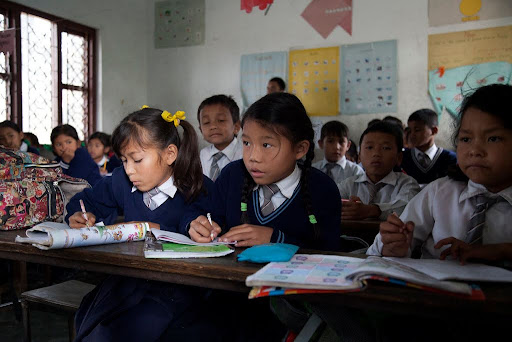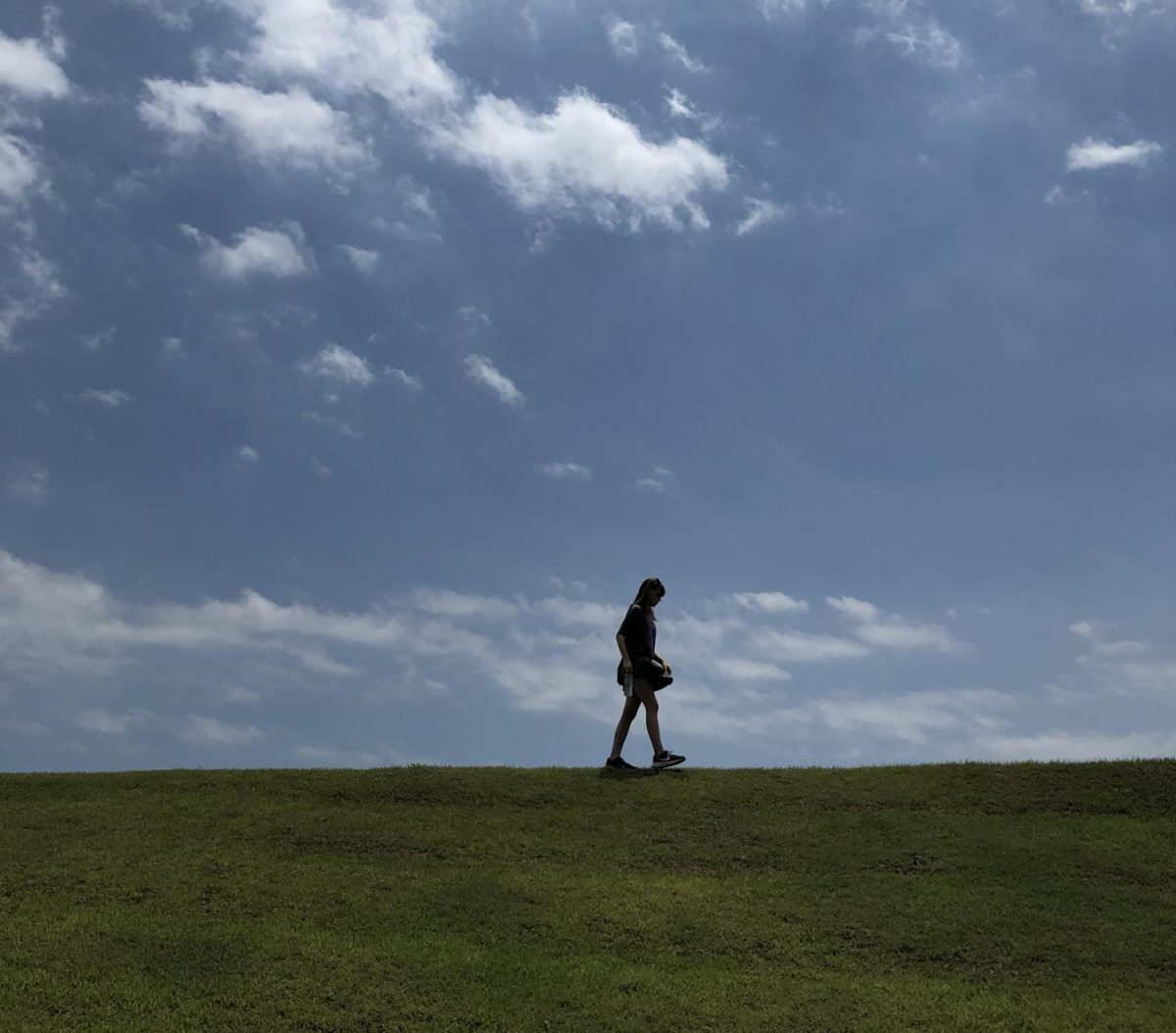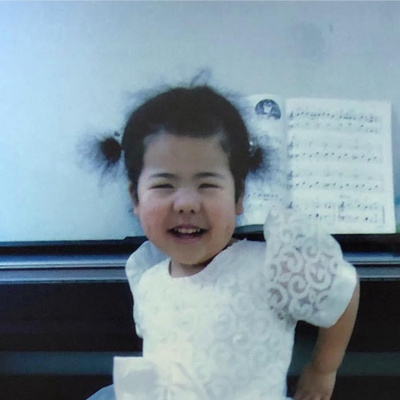Adult age lowered to 18 in Japan

日テレNEWS, YouTube
Celebrating the coming of age ceremony at Universal Studios in Osaka, Japan.
March 9, 2022
There is less than a month to go until the legal adult age, or age of majority, is lowered from age 20 to 18 in Japan. In response to this, current high school students are juggling a mixture of excitement and anxiety.
The decision to lower the legal adult age was made by the Japanese government in June 2018, three years after the voting age was lowered from age 20 to18. This year will mark 142 years since the last change which took place during the Meiji period in 1876, when the legal adult age was raised from age 13 for girls and age 15 for boys, to age 20 for both genders.
Out of the 38 OECD (Organization for Economic Co-operation and Development) countries, Japan is one of the few countries where the legal adult age is not 18 years old. Aside from Japan, New Zealand (with a legal age of 20 years old) and Korea (with a legal age of 19 years old) are countries that have not conformed to the majority legal adult age, according to the OECD Family database.
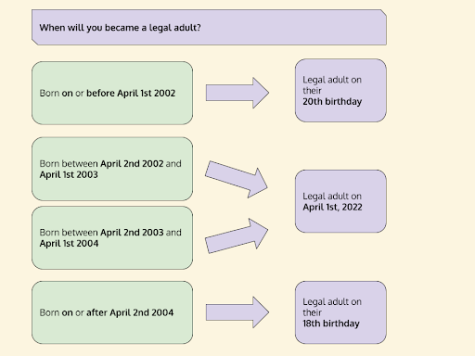
While there are many speculations as to why the legal adult age in Japan has been lowered, one of the main assumptions lies with Japan’s pressing concern about the declining population. As of April 2021, Japan’s population of children has dropped for the 40th consecutive year according to The Asahi Shimbun.
Along with this change, women can no longer get married at 16 years old even if they have parental consent. With Japan infamously being reported to be in the 120th place in the area of gender equality by the WEF (World Economic Forum), raising the age of marriage for women to be the same as the age of marriage for men (18 years old) is a first step in ensuring both men and women have the same rights. Since there is no legal age to be married with parental consent, women and men can both make their own decisions as to when and who they want to marry. Yuzu I., a 12th grade student attending ISSH, says, “I thought the previous laws (16 for women and 18 for men) were based on old conventions that are now outdated. The age of consent is still 13, and I feel that in many ways the Japanese laws don’t reflect the social standards of today. I think it’s good that the laws are being changed, but I think there is more to go.”
According to The Mainichi, over 2 million between the ages 18 and 19 years old will be considered a legal adult by next month. Most Japanese students will be in their final year of high school, heading into their first year of university, or working by the time they turn 18 years old. If a person plans to attend university or work away from their home, being able to manage their own credit card or rent a home for themselves without their parents’ consent will allow them to live more independently and rely less on their parents. Furthermore, people age 18 and over will now be able to do the following activities represented in the chart below:
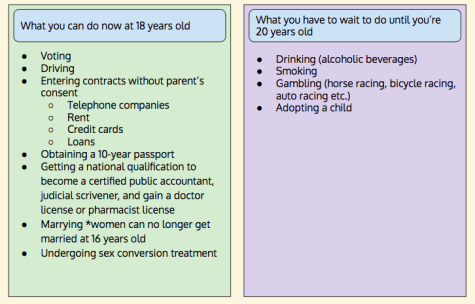
Being independent and having more responsibility come hand in hand. As an 18 year old, it is now possible to sign contracts for credit cards, loans, and rent, without parental consent. Previously, contracts made under 18 year olds could be canceled if they were signed without parental consent. However, with the new legal adult age, there’s no way to outrun your debts. In a survey sent to high school students in the International School of the Sacred Heart, 1 out of 4 students responded that their biggest concern when turning 18 is taking out loans, with high school student commenting, “I heard that sometimes young people don’t understand deals well enough before signing loans, rents, or like important money things and that can cause them problems later on, and being an adult, you need to take all the responsibility, so I am worried of making mistakes.”
The Juvenile Law will also be revised so that from this upcoming April, 18 year olds are no longer considered minors, and stricter sentences or punishments compared to juvenile criminals under the age of 18. In addition to stricter sentences, the name of the suspect can be disclosed to the public and published in the media.
As high school students prepare to step into adulthood, there should be more education on what rights students will have now that they are considered legal adults. This academic year, the Personal Finance course in ISSH has become a mandatory class for 12th graders, teaching skills such as how to avoid credit card debts and begin investing along with other finance tips. As laws become effective, there should be additional education regarding the changes and the rights that 18 year olds now have in order to see a smooth and effective transition. Prasha S., a 12th grade student attending ISSH, says, “We need more preparation, we need more information on laws and regulations so that we are ready for life as an adult.”
One thing that has been left ambiguous with this change in legal adult age is Japan’s coming of age ceremony, which will be held on January 9, 2023. Many Japanese high school students in their third (final) year of high school will be busy with juken (university entrance exams), and there have been opinions that these students will not be able to enjoy or attend the ceremony. In addition to that, it is possible that the upcoming coming of age ceremony (2023) will consist of people aged 18 to 20. According to the Ministry of Justice, it is up to the prefecture to decide whether or not the coming of age ceremony will remain for 20 year olds, or if they will welcome 18-19 year olds.
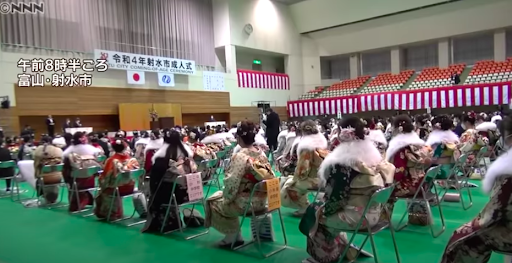
(Photo Credit: 日テレNEWS, YouTube)


